Bradley Byrne: Democrats: gone fishin’

There is an old expression that goes, “the worst day of fishing beats the best day of working.” As an avid fisherman myself, I can certainly understand the feeling behind that saying. But, sometimes, fishing is the worst thing to be doing, especially when there is important work to be done. This past week, in the wake of the Mueller report finally being completed, Democrats hung the “Gone Fishin’” sign outside the Capitol. Not satisfied that Special Counsel Robert Mueller had reported that there was no collusion between President Trump’s campaign and Russia during the 2016 election, Democrat leadership dug-in on their calls for more investigations by Congress, fishing for more evidence even though years of looking found nothing. After the first fishing expedition led by Mueller failed to bring in the “big catch” that Democrats hoped for, they are doubling down, somehow expecting different results. According to Mueller, no additional indictments are expected and Mr. Mueller will soon be leaving his position. It is over. This fishing trip was started all the way back in the Summer of 2016 and lasted until this March. It cost American taxpayers millions of dollars, the time of 40 FBI agents and 500 witness interviews, 22 months of unsubstantiated lies about President Trump from the liberal media, and a lifetime of divisiveness. It seems like the worst two years of fishing would have been much better spent focusing on working for the American people. We have heard for years from Democrats that the American people want answers. Finally, we have one: there was no collusion. The Democrats are not satisfied with this answer and they never will be. I think the American people deserve to know answers, just not the false ones my Democrat colleagues want. What I want to know now is what was known by the previous administration when calls for this investigation began. What did President Obama and his officials know when the FBI investigation was authorized all the way back in Summer 2016? Why did Democrats promise to deliver evidence of collusion when, after two years, nothing has been found? Attorney General William Barr will be releasing a version of the report compiled by Special Counsel Mueller to Congress soon. I very much look forward to reading it. But I will continue to ask the tough questions the people of Alabama really want asked. We stand by our President, and we still want answers. For now, I call on my Democrat colleagues to take down the “Gone Fishin’” sign, listen to the American people, listen to the truth, and let’s get back to work. There are a lot of real things to worry about right here in our own country, not made up stories about spies and espionage. Instead of fishing, let’s work on fixing our broken immigration system. We have thousands of foreign nationals pouring over our Southern Border every week. We have senseless murders at the hands of immigrants in our country illegally. We have violent crimes that can be prevented, if only Congress were to act. Let’s work on taking better care of our nation’s veterans. Let’s work on improving educational opportunities and choices for our young people. Let’s focus on the people we were elected to represent: the hardworking citizens of the United States of America. President Trump and conservative policies have spurred American economic growth to amazing new heights in the last two years, and through the national emergency declaration, we are in the starting phases of getting the border under control. There is still much work to be done for our country, and I’m ready to work. For the people of Southwest Alabama, “The Congressman is IN.” Bradley Byrne is a member of U.S. Congress representing Alabama’s 1st Congressional District.
Democrats ready to fight to make Robert Mueller report public
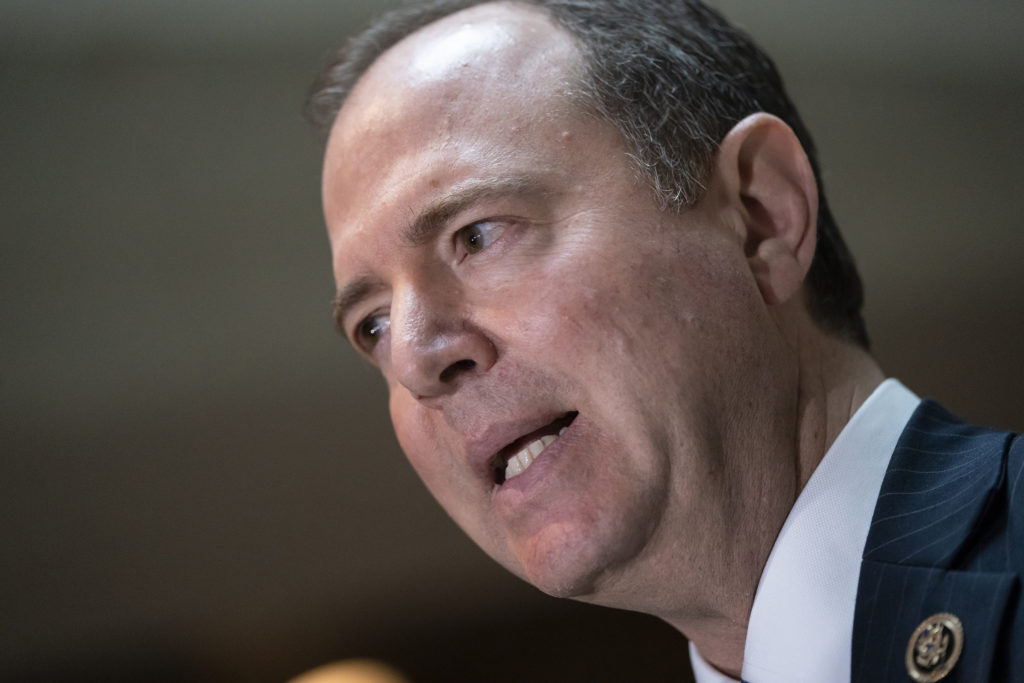
A top House Democrat has threatened to call special counsel Robert Mueller to Capitol Hill, subpoena documents and sue the Trump administration if the full report on Mueller’s Russia investigation is not made public. Rep. Adam Schiff, chairman of the House Intelligence Committee, said his committee will keep close watch on new Attorney General William Barr to see if he were “to try to bury any part of this report.” Schiff, D-Calif., also pledged to “take it to court if necessary.” He said anything less than complete disclosure would leave Barr, who now oversees the investigation, with “a tarnished legacy.” Schiff’s comments come as Democrats have made it clear that they are ready for an aggressive, public fight with the Justice Department if they are not satisfied with the level of access they have to Mueller’s findings. Mueller is showing signs of wrapping up his nearly 2-year-old investigation into possible coordination between Trump associates and Russia’s efforts to sway the 2016 election. The report isn’t expected to be delivered to the Justice Department this coming week. Barr has said he wants to release as much information as he can. But during his confirmation hearing last month, Barr made clear that he will decide what the public sees, and that any report will be in his words, not Mueller’s. Schiff, in a television interview, suggested that anything short of Mueller’s full report would not satisfy Democrats. He pointed to a public interest in seeing some of the underlying evidence, such as information gathered from searches conducted on longtime Trump adviser Roger Stone and Paul Manafort, a former Trump campaign chairman. With Democrats taking control of the House in January and Schiff now the committee chairman, he has undertaken his own investigation. That means re-examining issues covered by a now-closed GOP probe that concluded there was no evidence Trump’s campaign conspired with Russia. Schiff has said the committee also will pursue new matters, including whether foreign governments have leverage over Trump, his relatives or associates. Some Democrats are pointing to documents that Justice Department officials provided to Congress in the wake of the investigation of Hillary Clinton‘s emails, as well as information that Republicans demanded as part of their own inquiries. Schiff said he told department officials after they released information related to the Clinton investigation that “this was a new precedent they were setting and they were going to have to live by this precedent whether it was a Congress controlled by the Democrats or Republicans.” Beyond that, however, is “the intense public need to know here, which I think overrides any other consideration,” he said. Democrats could use Mueller’s findings as the basis of impeachment proceedings. In a letter Friday, Democrats warned against withholding information on Trump on the basis of department opinions that the president can’t be indicted. “We are going to get to the bottom of this,” Schiff said. “If the president is serious about all of his claims of exoneration, then he should welcome the publication of this report.” Many Republicans have also argued that the full report should be released, though most have stopped short of saying it should be subpoenaed. “We need to get the facts out there, get this behind us in a way that people thought that anybody that should have been talked to was talked to any question that should have been asked, was asked,” said Sen. Roy Blunt, a member of the Senate Intelligence Committee. But asked if he thought there could be a subpoena, Blunt, R-Mo., said, “I don’t know that you can.” The Senate committee also has been investigating whether Trump’s campaign conspired with Russia. Blunt suggested a conclusion in that probe might wait until after Mueller’s report. “We’d like to have frankly a little more access to the Mueller investigation before we come to a final conclusion,” Blunt said. “His report will help us write our final report. We’ve given Mueller full access to all of our interviews all of our investigation. We haven’t had that reciprocated and so we’ll soon find out what else is out there that we might not know about.” Schiff appeared on ABC’s “This Week,” and Blunt was on CBS’ “Face the Nation.” Republished with permission from the Associated Press.
Poll: Nearly 6 in 10 say Donald Trump impeded Russia probe

A majority of Americans say they believe President Donald Trump has tried to obstruct the investigation into his campaign’s ties to Russia, though the public is divided on whether he should be removed from office if he’s found to have stymied the probe, according to a new poll by The Associated Press-NORC Center for Public Affairs Research. Meanwhile, the survey shows Americans are somewhat less likely to say Congress should remove Trump from office if he directed his former personal attorney, Michael Cohen, to arrange hush money payments to cover up claims of extramarital relationships during the 2016 campaign. Still, opinions on both matters see a stark partisan divide. The poll was conducted just after federal prosecutors in New York implicated Trump in illegal payments to a former Playboy model and an adult-film actress and after special counsel Robert Mueller revealed that discussions over a possible Trump Tower in Moscow extended longer than had been previously known. It was done amid signs of intensifying legal danger for Trump, whose actions face scrutiny in New York and in Mueller’s investigation into possible coordination between Russia and the Trump campaign. Overall, 42 percent of Americans approve of the job Trump is doing as president, while 56 percent disapprove. Those numbers have held steady for most of the year. About 8 in 10 Republicans approve of Trump’s job performance, while just 1 in 10 Democrats say the same. The swirling investigations are helping define public opinion, creating clear divisions about whether and for what Trump should be impeached and to what extent he might be culpable of wrongdoing. A majority of Americans — 58 percent —think the president has tried to impede the Russia investigation, while 4 in 10 say he has not. An overwhelming share of Democrats, 90 percent, say the president has sought to obstruct the probe, compared with 22 percent of Republicans. The survey also shows that if Mueller’s investigation finds that Trump did not personally have inappropriate contacts with the Kremlin but nonetheless tried to obstruct the FBI’s work, 51 percent of Americans think Congress should take steps to remove him from office, while 46 percent think it should not. The special counsel’s obstruction investigation has shadowed the president for a year and a half, unfolding alongside his inquiry into whether the Trump campaign coordinated with Russia to sway the election and the separate campaign finance probe in New York. The last month has produced bombshell developments in the investigation, including Cohen’s sentencing, allegations that Trump’s former campaign chairman lied to prosecutors and a judge’s unexpected upbraiding of former national security adviser Michael Flynn. Jonathan Levine, a 64-year-old financial services professional in Connecticut, said he was especially concerned by reports that negotiations over a Trump Tower in Moscow continued deep into the 2016 campaign. “He’s running to be president of the United States. The United States is ideologically opposed to Russia, so he’s accidentally dealing with the enemy, accidentally in bed with the enemy,” Levine said. “Obviously he should have discontinued negotiations in Moscow when he turned the campaign on full time.” Levine said he could support impeachment if there were appropriate hearings and solid evidence. But there are major partisan divides about what constitutes an impeachable offense. About 8 in 10 Democrats and 2 in 10 Republicans think Trump should be removed from office if he committed obstruction. Nearly three-quarters of Democrats and only about 1 in 10 Republicans think Congress should take steps to impeach him if he directed illegal payments. Overall, 45 percent said Congress should take steps to remove him from office if he orchestrated the hush money payments. Slightly more, 53 percent, said Congress should not take steps to remove Trump for that. About 4 in 10 think he broke the law when it comes to directing Cohen’s payments, and about as many say the same of his ties to Russia. About 2 in 10 think Trump has done nothing wrong, with the remainder saying his actions were unethical, but not illegal. About 7 in 10 Democrats believe Trump has done something illegal involving Russia. Among Republicans, 55 percent say Trump has done nothing wrong when it comes to Russia, while 35 percent think he has done something unethical but not illegal. Matthew Behrs, a maintenance coordinator from Plymouth, Wisconsin, is among those unconvinced by the allegations. He said he was skeptical of the impact Russia actually had on the election and wondered why Mueller hadn’t provided direct evidence of collusion if the problem was so prevalent. “If there was this collusion, why wasn’t this (over in) three months,” he said. “Here are the emails, here’s the contact, here’s the collusion. Here it is.” Nearly 7 in 10 Democrats find illegality for Trump in Cohen’s payments, while just 7 percent of Republicans say the same. Among Republicans, 49 percent think Trump did something unethical, but not illegal, while 44 percent think he did nothing wrong. The poll finds rising confidence among Democrats of the fairness and impartiality of Mueller’s investigation. Overall, about a third of Americans say they’re extremely or very confident that the inquiry is fair and impartial; another quarter say they are moderately confident. Roughly 4 in 10 say they’re not confident. Democrats are more likely to express confidence today compared with a year ago, 51 percent to 38 percent. Just 14 percent of Republicans say they are confident, which is unchanged from last year. ___ The AP-NORC poll of 1,067 adults was conducted Dec. 13-16 using a sample drawn from NORC’s probability-based AmeriSpeak Panel, which is designed to be representative of the U.S. population. The margin of sampling error for all respondents is plus or minus 4.1 percentage points. Respondents were first selected randomly using address-based sampling methods, and later interviewed online or by phone. ___ Republished with permission from the Associated Press.
A look at where the investigations related to Donald Trump stand
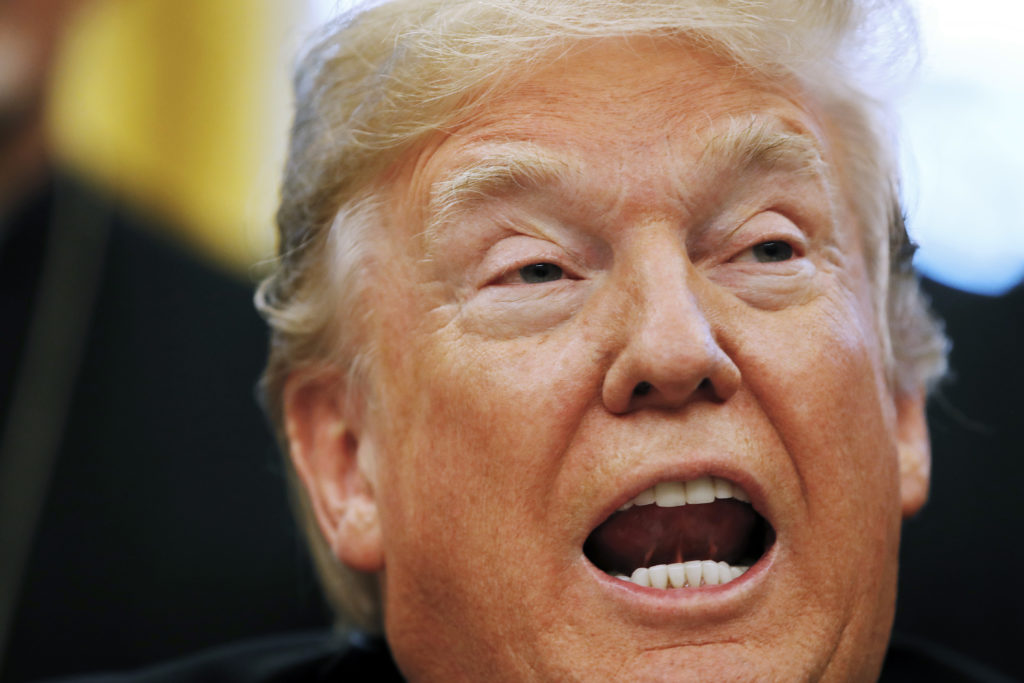
A look at where the investigations related to President Donald Trump stand and what may lie ahead for him. WHAT’S THIS ALL ABOUT? Trump is facing criminal investigations in Washington and New York. Special counsel Robert Mueller is looking into whether the Trump campaign coordinated with Russia and whether the president obstructed the investigation. Trump also plays a central role in a separate case in New York, where prosecutors have implicated him in a crime. They say Trump directed his personal lawyer Michael Cohen to make illegal hush money payments to two women as a way to quash potential sex scandals during the campaign. ___ SO … DID THE TRUMP CAMPAIGN COLLUDE WITH RUSSIA? There is no smoking gun when it comes to the question of Russia collusion. But the evidence so far shows a broad range of Trump associates had Russia-related contacts during the 2016 presidential campaign and transition period, and that several lied about the communication. There is also evidence that some people in Trump’s orbit were discussing a possible email dump from WikiLeaks before it occurred. American intelligence agencies and Mueller have said Russia was the source of hacked material released by WikiLeaks during the campaign that was damaging to Hillary Clinton‘s presidential effort. ___ OTHER QUESTIONS TO CONSIDER: WHAT ABOUT OBSTRUCTION OF JUSTICE? That is another unresolved question that Mueller is pursuing. Investigators have examined key episodes such as Trump’s firing of former FBI Director James Comey and his fury over the recusal from the investigation of former Attorney General Jeff Sessions. WHAT DOES TRUMP HAVE TO SAY ABOUT ALL THIS? Trump has repeatedly slammed the Mueller investigation as a “witch hunt” and insisted there was “NO COLLUSION” with Russia. He also says his now-former lawyer, Cohen, lied to get a lighter sentence in New York. WHAT DO I NEED TO KNOW TODAY? Cohen, who made his career protecting Trump, is to appear on Wednesday at a courthouse in Manhattan for a sentencing hearing. He’s set to learn whether his decision to cooperate with federal investigators will lessen his punishment for dodging taxes, lying to Congress and violating campaign finance laws. Two former Trump aides pleaded their case to judges Tuesday in hopes of easing the punishment they could face for their crimes. Lawyers for former Trump administration national security adviser Michael Flynn asked a judge Tuesday to spare him prison time, saying he had devoted his career to his country and taken responsibility for an “uncharacteristic error in judgment.” Flynn has admitted lying to the FBI just days after Trump took office about conversations he had during the transition with the then-Russian ambassador to the United States. Also Tuesday, lawyers for former Trump campaign chairman Paul Manafort said they were still deciding whether to dispute allegations that he lied to investigators and breached a plea agreement. Manafort has been convicted in Washington and Virginia of crimes related to years of Ukrainian political consulting work. Although the charges don’t directly touch Trump, Manafort was a central figure during the campaign, which means he could pass along potentially damaging information. Republished with permission from the Associated Press.
Top House Dems raise prospect of impeachment, jail for Donald Trump
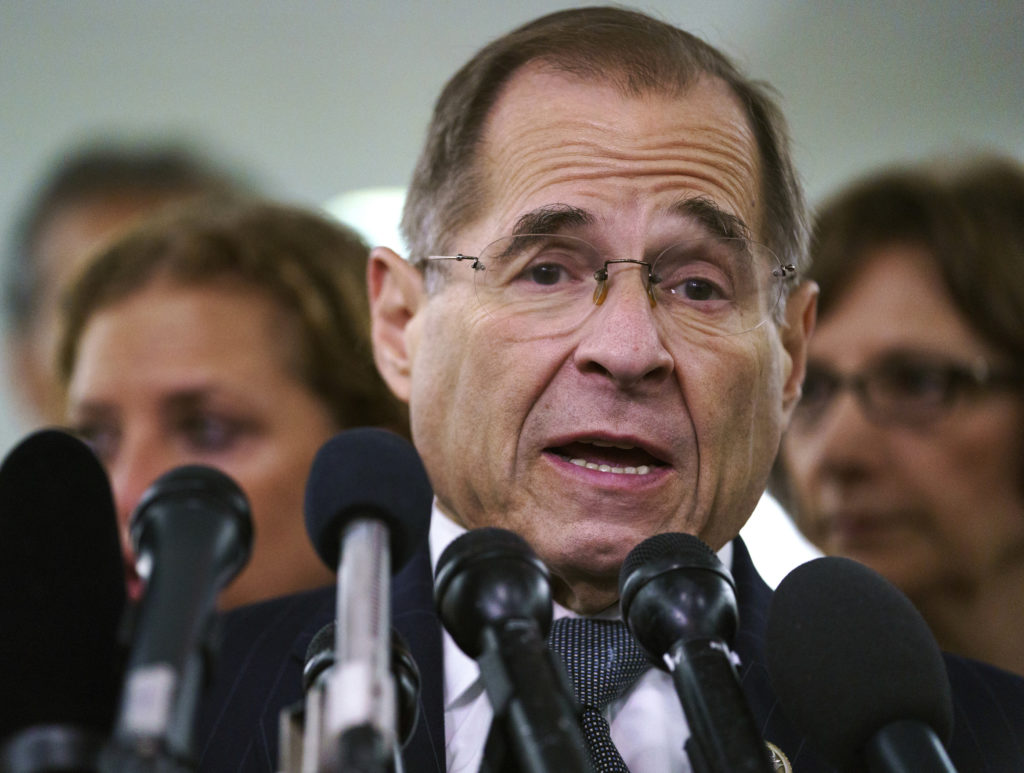
Top House Democrats have raised the prospect of impeachment or the real possibility of prison time for President Donald Trump if it’s proved that he directed illegal hush money payments to women, adding to the legal pressure on the president over the Russia investigation and other scandals. “There’s a very real prospect that on the day Donald Trump leaves office, the Justice Department may indict him, that he may be the first president in quite some time to face the real prospect of jail time,” said Rep. Adam Schiff, the incoming chairman of the House intelligence committee. “The bigger pardon question may come down the road as the next president has to determine whether to pardon Donald Trump.” Rep. Jerry Nadler, the incoming chairman of the House Judiciary Committee, described the details in prosecutors’ filings Friday in the case of Trump’s former personal lawyer, Michael Cohen, as evidence that Trump was “at the center of a massive fraud.” “They would be impeachable offenses,” Nadler said. In the filings, prosecutors in New York for the first time link Trump to a federal crime of illegal payments to buy the silence of two women during the 2016 campaign. Special counsel Robert Mueller‘s office also laid out previously undisclosed contacts between Trump associates and Russian intermediaries and suggested the Kremlin aimed early on to influence Trump and his Republican campaign by playing to both his political and personal business interests. Trump has denied wrongdoing and has compared the investigations to a “witch hunt.” Nadler, D-N.Y., said it was too early to say whether Congress would pursue impeachment proceedings based on the illegal payments alone because lawmakers would need to weigh the gravity of the offense to justify “overturning” the 2016 election. Nadler and other lawmakers said Sunday they would await additional details from Mueller’s investigation into Russian election interference and possible coordination with the Trump campaign to determine the extent of Trump’s misconduct. Regarding the illegal payments, “whether they are important enough to justify an impeachment is a different question, but certainly they’d be impeachable offenses because even though they were committed before the president became president, they were committed in the service of fraudulently obtaining the office,” Nadler said. Mueller has not said when he will complete a report of any findings, and it isn’t clear that any such report would be made available to Congress. That would be up to the attorney general. Trump on Friday said he would nominate former Attorney General William Barr to the post to succeed Jeff Sessions. Nadler indicated that Democrats, who will control the House in January, will step up their own investigations. He said Congress, the Justice Department and the special counsel need to dig deeper into the allegations, which include questions about whether Trump lied about his business arrangements with Russians and about possible obstruction of justice. “The new Congress will not try to shield the president,” he said. “We will try to get to the bottom of this, in order to serve the American people and to stop this massive conspiracy — this massive fraud on the American people.” Schiff, D-Calif., also stressed a need to wait “until we see the full picture.” He has previously indicated his panel would seek to look into the Trump family’s business ties with Russia. “I think we also need to see this as a part of a broader pattern of potential misconduct by the president, and it’s that broad pattern, I think, that will lead us to a conclusion about whether it rises to the level to warrant removal from office,” Schiff said. In the legal filings, the Justice Department stopped short of accusing Trump of directly committing a crime. But it said Trump told Cohen to make illegal payments to porn actress Stormy Daniels and former Playboy model Karen McDougal, both of whom claimed to have had affairs with Trump more than a decade ago. In separate filings, Mueller’s team detail how Cohen spoke to a Russian who “claimed to be a ‘trusted person’ in the Russian Federation who could offer the campaign ‘political synergy’ and ‘synergy on a government level.’” Cohen said he never followed up on that meeting. Mueller’s team also said former campaign chairman Paul Manafort lied to them about his contacts with a Russian associate and Trump administration officials, including in 2018. Republican Sen. Marco Rubio of Florida called the latest filings “relevant” in judging Trump’s fitness for office but said lawmakers need more information to render judgment. He also warned the White House about considering a pardon for Manafort, saying such a step could trigger congressional debate about limiting a president’s pardon powers. Such a move would be “a terrible mistake,” Rubio said. “Pardons should be used judiciously. They’re used for cases with extraordinary circumstances.” Sen. Angus King, an independent from Maine and a member of the Senate intelligence committee, cautioned against a rush to impeachment, which he said citizens could interpret as “political revenge and a coup against the president.” “The best way to solve a problem like this, to me, is elections,” King said. “I’m a conservative when it comes to impeachment. I think it’s a last resort and only when the evidence is clear of a really substantial legal violation. We may get there, but we’re not there now.” Democratic Sen. Chris Murphy of Connecticut urged Mueller to “show his cards soon” so that Congress can make a determination early next year on whether to act on impeachment. “Let’s be clear: We have reached a new level in the investigation,” Murphy said. “It’s important for Congress to get all of the underlying facts and data and evidence that the special counsel has.” Nadler spoke on CNN’s “State of the Union” Sunday, Rubio was on CNN and ABC’s “This Week,” and Schiff appeared on CBS’ “Face the Nation.” Murphy spoke on ABC, and King was on NBC’s “Meet the Press.” Republished with permission from the Associated Press.
Lawyer: Donald Trump provides written answers to Robert Mueller questions
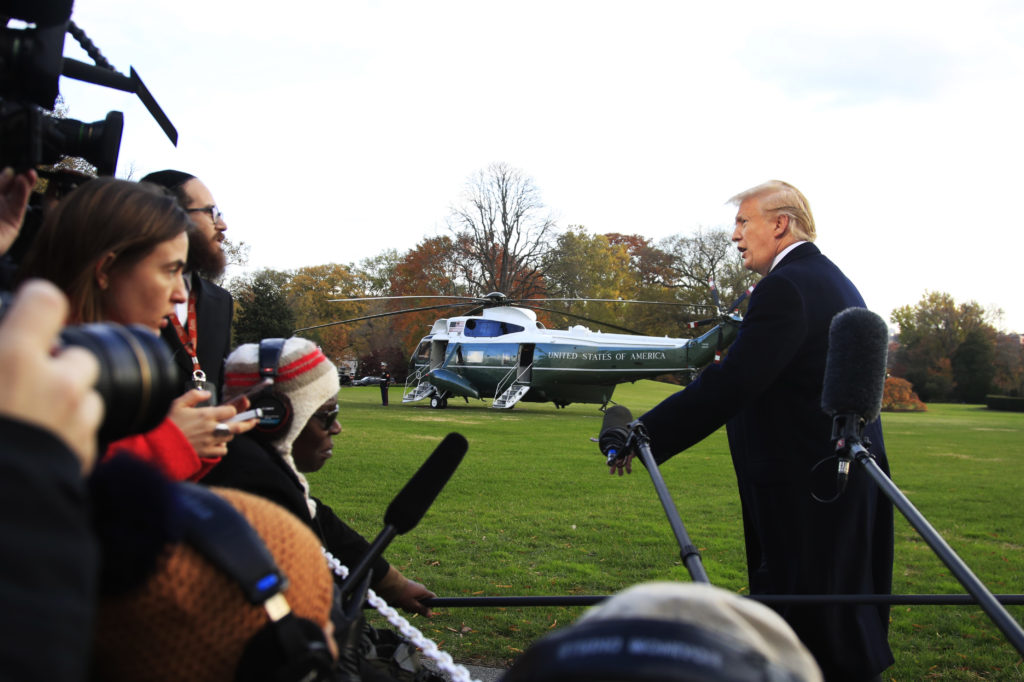
Lawyers for President Donald Trump say they’ve provided the special counsel’s office with written responses to questions on Russian election interference. The answers are an important milestone in Robert Mueller‘s probe, marking the first time the president is known to have described to investigators his knowledge of key moments under scrutiny by the special counsel’s office. Trump told reporters last week that he was answering the questions himself. Jay Sekulow, a lawyer for Trump, said in a statement that the answers were provided Tuesday. It is not clear what other information Mueller’s office will seek. This round of questioning was limited to the general topic of whether the Trump campaign coordinated with Russia. But Mueller’s team has also wanted to question Trump about whether he committed obstruction of justice. Republished with permission from the Associated Press.
Jeff Flake vows to oppose judges unless Robert Mueller bill gets a vote
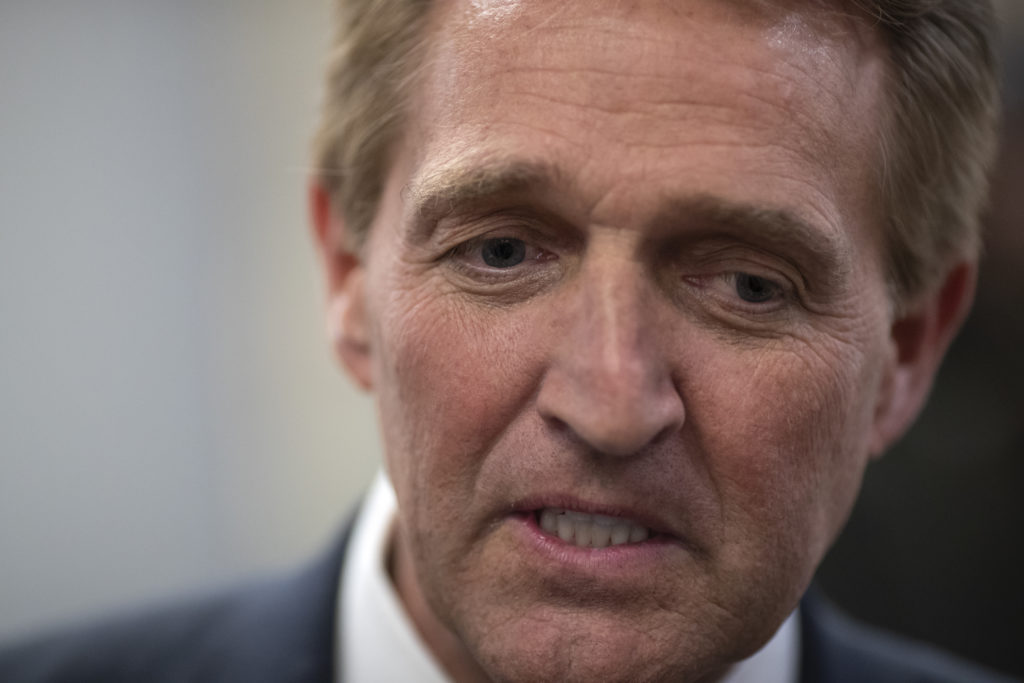
Republican Sen. Jeff Flake said Wednesday that he won’t vote to confirm judicial nominees unless GOP leaders hold a vote on legislation to protect special counsel Robert Mueller from being fired. Flake of Arizona and Democratic Sen. Chris Coons of Delaware went to the Senate floor on Wednesday and tried to bring the legislation up for a vote. But Senate Majority Leader Mitch McConnell objected. McConnell has said that the legislation is unnecessary because he believes Mueller won’t be fired. Flake and Coons called for the vote in the wake of Attorney General Jeff Sessions‘ departure. President Donald Trump pushed Sessions out last week and temporarily replaced him with a loyalist, Matt Whitaker, who has criticized the Mueller investigation. The special counsel’s probe is investigating Russian interference in the 2016 presidential election and Russian ties to Trump’s Republican campaign. “This is not a moment for our leadership to be weak or irresolute or compromised in any way,” Flake said, adding that “the president now has this investigation in his sights and we all know it.” He said the appointment of Whitaker was a “blatant” move that increased the urgency for the legislation. Flake, who retires in January, said he wouldn’t vote to confirm judges on the Senate floor or to advance them out of committee until there was a vote on the Mueller bill. He said he’d continue to come to the Senate floor to call for one. McConnell objected without comment. But he said earlier Wednesday that he’s never heard anyone at the White House suggest they want to shut the investigation down. “I think it’s in no danger, so I don’t think any legislation is necessary,” McConnell said. The move by Flake and Coons comes more than a year after the bipartisan legislation was introduced and underscores the deep concerns many lawmakers have long had over Trump’s comments about Mueller’s investigation. Trump has repeatedly called the probe a “hoax” and leveled personal criticism at the former FBI director. Those concerns were only amplified after Trump appointed Whitaker as acting attorney general. Whitaker is now overseeing the probe, which had previously been overseen by Deputy Attorney General Rod Rosenstein. Rosenstein told Congress that he saw no reason to fire Mueller. Sessions had recused himself from overseeing Mueller because he worked on Trump’s campaign — a decision that infuriated Trump and led to Sessions’ resignation. Several other Republicans have said they would vote for the special counsel bill. They include Senate Judiciary Committee Chairman Chuck Grassley, Maine Sen. Susan Collins and the legislation’s GOP co-sponsors, South Carolina Sen. Lindsey Graham and North Carolina Sen. Thom Tillis. Democrats, who will take the House majority in January, have also said shielding Mueller’s investigation will be one of their top priorities. Along with Senate Democratic leader Chuck Schumer, they have called for the special counsel bill to be added to a year-end spending bill that must pass in December to avoid a partial government shutdown. The bipartisan legislation to protect Mueller was approved by the Senate Judiciary Committee in April. It would give any special counsel a 10-day window to seek expedited judicial review of a firing and put into law existing Justice Department regulations that a special counsel can only be fired for good cause. Despite some GOP support, it’s unclear if the measure could gain 60 votes in the Senate — and even less clear that Trump would sign a bill that contained the legislation. Flake and Coons said they were certain they could get 60 votes and noted that Trump has changed his mind on legislation before. On Tuesday, Grassley said that he would leave the decision up to McConnell but that “if it comes to a vote, I will vote for that bill.” Graham, who is close to Trump, said he doesn’t expect Mueller to be fired, “but it would probably be good to have this legislation in place just for the future.” Tillis said he was talking to other senators about how they might be able to get it done. Collins said passage of the bill would “send a powerful message that Mr. Mueller must be able to complete his work unimpeded.” Mueller’s investigation has already resulted in six guilty pleas, a trial conviction and pending charges against more than two dozen others, including Russian intelligence officers. According to a new court filing Wednesday, the investigation could go on for several more months. Prosecutors say they’re not ready for Trump campaign aide Rick Gates to be sentenced because he is continuing to cooperate with “several ongoing investigations.” And they’re asking a federal judge to give them until mid-January to offer another update about his case. Gates pleaded guilty this year to two felonies as part of the probe. Gates’ mentor, ex-Trump campaign chairman Paul Manafort, was convicted this year on eight counts of tax and bank fraud. He is also cooperating. Republished with permission from the Associated Press.
Russia probe revival expected if Democrats win House

House Democrats are expected to reopen the investigation into Russian interference in the 2016 election if they win the majority in November. But they would have to be selective in what they investigate. California Rep. Adam Schiff, the top Democrat on the House intelligence panel, has said his party would have to “ruthlessly prioritize the most important matters first.” The Republican-led Intelligence Committee was the only House panel to investigate Russian meddling, and its investigation is now closed. Republicans say they found no evidence of collusion between Russia and President Donald Trump‘s campaign. Democrats say Republicans ignored key facts and important witnesses and want to restart parts of the investigation if they win the House. But some Democrats also worry that there could be a political cost if they overreach. Schiff and other lawmakers say they are closely watching special counsel Robert Mueller‘s Russia investigation and the Senate’s Russia probe to look for gaps that they could fill. And if Mueller issues any findings, their investigative plans could change. “My sense is that we want to be precise,” says California Rep. Eric Swalwell, a Democratic member of the intelligence panel. Here’s a look at what Democrats are likely to investigate if they take the House majority. ___ MONEY LAUNDERING Schiff has repeatedly said a priority for Democrats would be investigating whether Russians used laundered money for transactions with the Trump Organization. Trump’s businesses have benefited from Russian investment over the years. Schiff said he wants to know whether “this is the leverage that the Russians have” over Trump. Other committees might also want to look into money laundering, including the House Financial Services panel. It’s unclear whether Mueller is probing money laundering related to the president’s business. ___ MORE WITNESSES The Democrats issued a list in March of several dozen people whom the committee hadn’t yet interviewed when the Russia investigation was shut down. Democrats would want to call in some — but probably not all — of those witnesses. Former Trump campaign advisers Michael Flynn, Paul Manafort, Rick Gates, and George Papadopoulos are among them. They all pleaded guilty to various charges in the Mueller probe and have cooperated with prosecutors. Important witnesses whose credibility Democrats have questioned might also be called back. That includes Trump’s former personal lawyer, Michael Cohen, who pleaded guilty in federal court in August to campaign-finance violations and other charges, and prominent Trump supporter Erik Prince, who met with Russians during the campaign. Prince was defiant in an interview with the intelligence panel in December. “I believe there are those who were less than candid with us,” says Illinois Rep. Mike Quigley, a Democratic member of the committee, referring to Cohen and Prince, among others. Democrats have said they also want additional documents that Republicans refused to subpoena. ___ PUBLIC HEARINGS House Republicans limited their Russia investigation to the intelligence panel, which traditionally conducts most of its business in secret. Democrats would probably spread the investigation over several other committees, opening it up and allowing for public hearings with top Trump officials. Texas Rep. Joaquin Castro, a Democratic member of the intelligence panel, says they would try to be more transparent. The Republican investigation was “a way to keep everything behind closed doors,” he said. Democrats would also push to provide interview transcripts to Mueller, a step Republicans had resisted. The committee recently voted to make most of its Russia transcripts public, but it’s unclear when that will happen. ___ DONALD TRUMP JR. Democrats have pushed for more information about the president’s son, Donald Trump Jr., and communications with his father and other aides related to a June 2016 meeting between Trump campaign officials and a Russian lawyer. According to phone records he provided to Congress, Trump Jr. had a call with a blocked number several days before the meeting took place; he said he didn’t recall with whom. Democrats want to subpoena additional phone records because Trump Jr. has insisted he didn’t alert his father to the meeting beforehand. They also want more information about his communications with former Trump communications aide Hope Hicks. Democrats may also look into direct messages on Twitter between Trump Jr. and WikiLeaks, the website that released emails from top Democratic officials during the 2016 campaign. Trump Jr. has released those direct messages, in which the website urged him to publicize its leaks. ___ TRUMP’S TAXES Democrats in the majority would probably push for the release of Trump’s tax returns, a task that would be up to the House Ways and Means Committee. Trump broke a decades long tradition by declining to release his returns during the campaign. The Republican House and Senate have declined to ask for them. Lawmakers hope that access to Trump’s taxes would reveal information about his financial entanglements with other countries, among other things. But getting them may not be easy. The tax-writing committees in Congress can obtain tax records from the IRS under the law, but it is possible the Trump administration would refuse to hand them over, prompting a court fight. ___ ISSUES RELATED TO COLLUSION Since Republicans closed the Russia investigation earlier this year, Democrats on the intelligence panel have conducted some of their own investigations despite not having subpoena power. They have made some progress in probing Cambridge Analytica, a data analytics firm once employed by the Trump campaign that improperly gained access to data from millions of social media profiles. They have also investigated Republican operative Peter W. Smith, who worked to obtain Democrat Hillary Clinton’s emails from Russian hackers, according to The Wall Street Journal. Smith died shortly after talking to the paper. ___ PROTECTION FOR ROBERT MUELLER A Democratic House would probably try to move legislation to protect special counsel Mueller. Trump has repeatedly criticized Mueller and his investigation, calling it a witch hunt. Prompted by concerns that Trump may try to fire Mueller, the GOP-led Senate Judiciary Committee approved legislation in April that would give any special counsel a 10-day window to seek expedited
Brett Kavanaugh faces final round of questioning without missteps
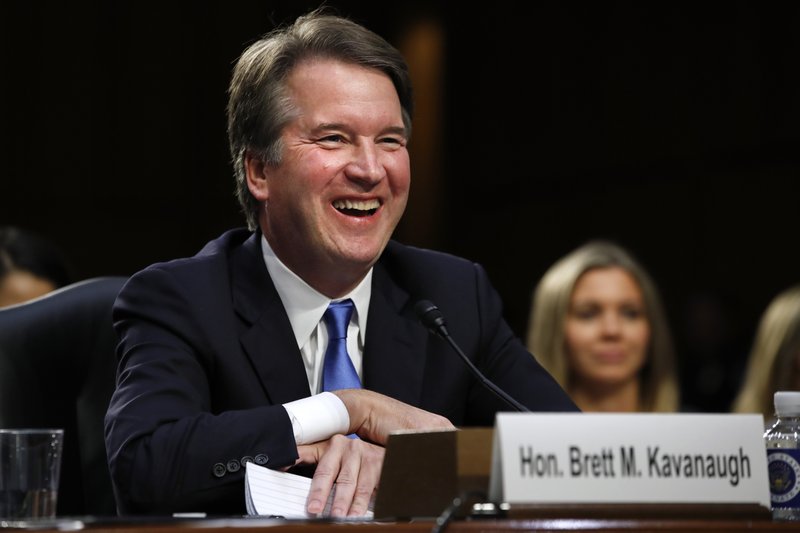
Senators will launch a final round of questioning of Brett Kavanaugh on Thursday, but after a marathon 12-hour session, President Donald Trump’s nominee to the Supreme Court appears to have avoided any major missteps that could trip his confirmation. So far, Kavanaugh does not seem to have changed minds on the Judiciary Committee, which is split along partisan lines. The judge left unanswered questions over how he would handle investigations of the executive branch and whether he would recuse himself if cases involving Trump under special counsel Robert Mueller’s probe end up at the court. His credibility may face new tests by senators who are seeking to make public some emails and documents from his Bush White House years that are being withheld by the committee as confidential. Trump says he’s pleased with his nominee’s televised performance, and Republicans are united behind him, eager to add a conservative judge to the court. The questioning of Kavanaugh has carried strong political overtones ahead of the November congressional elections. Democrats lack the votes to block confirmation, but have been pressing Kavanaugh for his views on abortion rights, gun control and other issues. Protesters have added to the challenges for Kavanaugh, repeatedly interrupting proceedings. “You’re more than halfway done,” Sen. Thom Tillis, R-N.C., told Kavanaugh as he gaveled the hearing closed late Wednesday. Pressured by Democrats with Trump on their minds during Wednesday’s grueling session, the judge insisted that he fully embraced the importance of judicial independence. But he refused to provide direct answers to Democrats who wanted him to say whether there are limits on a president’s power to issue pardons, including to himself or in exchange for a bribe. He also would not say whether he believes the president can be subpoenaed to testify. Still, he began his long day in the witness chair by declaring that “no one is above the law.” When Sen. Jeff Flake, R-Ariz., asked what constraints exist on executive power, the judge cited existing laws but also norms. “Norms are important. Historical practice is relevant to judicial decision-making,” he said. Democrats are concerned that Kavanaugh will push the court to the right and that he will side with Trump in cases stemming from Mueller’s investigation of Russian interference in the 2016 election and possible ties to the Trump campaign. The 53-year-old appellate judge answered cautiously when asked about most of those matters, refusing an invitation from Democratic Sen. Richard Blumenthal of Connecticut to pledge to step aside from any Supreme Court cases dealing with Trump and Mueller’s investigation. Under questioning by Republicans, Kavanaugh stressed the importance of judicial independence, “not being swayed by political or public pressure.” On abortion, Kavanaugh said the landmark 1973 Roe v. Wade decision that ensures access to abortion has been affirmed “many times.” He defended his dissenting opinion last year in the case of a pregnant immigrant teen in federal custody. Kavanaugh would have denied her immediate access to an abortion, even after she received permission from a Texas judge. Sen. Orrin Hatch, R-Utah, praised Kavanaugh for hiring female lawyers as clerks as a judge on the District of Columbia Court of Appeals, and then posed questions about whether Kavanaugh was aware of sexual harassment allegations against retired circuit court Judge Alex Kozinski in California. Kavanaugh, who considered the judge a friend and mentor, said he had known nothing about the allegations until they were disclosed last year. “It was a gut punch for me,” he said, and he was “shocked, disappointed, angry.” Kavanaugh also told Sen. Mazie Hirono, D-Hawaii, he was unaware of the domestic violence allegations against Rob Porter, who was Trump’s staff secretary. Journalist Bob Woodward’s new book about Trump says Kavanaugh recommended Porter for the job. Kavanaugh had served as staff secretary to George W. Bush and his work in the White House has figured in the hearing. Democratic senators have fought for access to documents from his three years as staff secretary, saying those could shed light on his views about policies from that era, including the detention and interrogation of terror suspects. Republicans have declined to seek the papers, and instead have gathered documents from his work as White House counsel to Bush. When questioned about the honesty of his 2006 testimony during his nomination for the appellate court when he said he was not involved in some Bush-era policies, Kavanaugh said he was “100 percent accurate.” Late Wednesday, Sen. Cory Booker, D-N.J., drew a rare partnership with Sen. Mike Lee, R-Utah, to release of some of the Bush-era documents. Lee complained that Booker was relying on an unreleased email to question Kavanaugh’s openness to racial profiling by police, but then agreed to work for its release. Republicans hope to confirm Kavanaugh in time for the first day of the new Supreme Court term, Oct. 1. Republished with the permission of the Associated Press.
Jeff Sessions seems to push back against Donald Trump barb
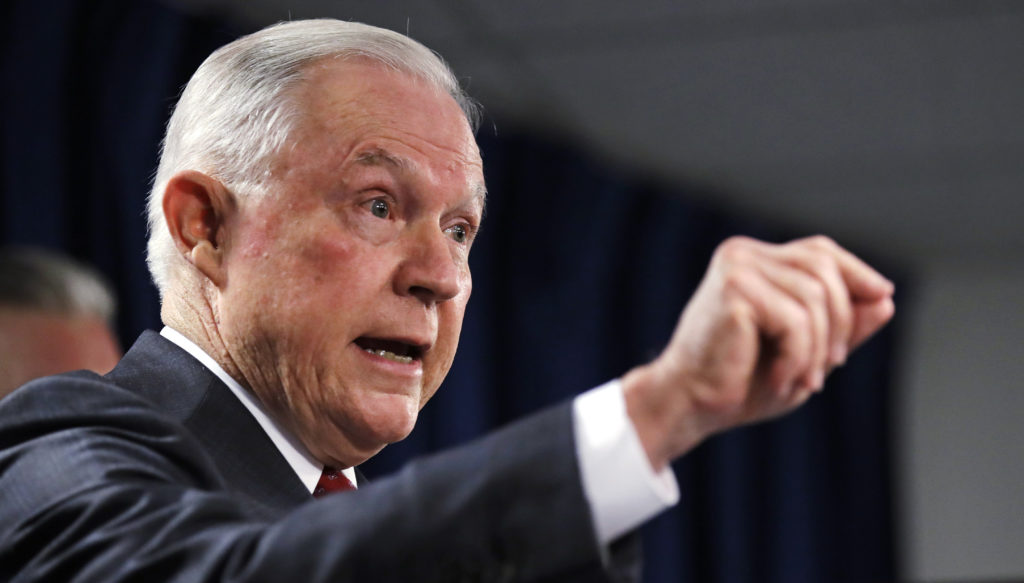
The Latest on President Donald Trump (all times local): 1:35 p.m. Attorney General Jeff Sessions says his Justice Department won’t be “improperly influenced by political considerations.” His comments — in a statement Thursday — seem to push back against the latest round of criticism by his boss, President Donald Trump, who has repeatedly railed against the department and the FBI. Trump told “Fox & Friends” in an interview that aired earlier Thursday that Sessions “never took control of the Justice Department and it’s a sort of an incredible thing.” The president was angered when Sessions stepped aside from overseeing the federal investigation into Russian meddling in the 2016 election. Trump has called the special counsel’s probe a “witch hunt.” Sessions says there’s no other nation with more talented and dedicated law enforcement investigators and prosecutors. Sessions says he’s “proud of the work we have done in successfully advancing the rule of law.” ___ 1:30 p.m. The chairman of the Senate Judiciary Committee says his staffers have reached out to Michael Cohen, President Donald Trump’s former lawyer, about what information he might have — and they’re awaiting a response. GOP Sen. Chuck Grassley of Iowa says no decision has been made about Cohen appearing before the committee. Cohen pleaded guilty this week in federal court to campaign-finance violations and other charges. He says he and then-candidate Trump arranged the payment of hush money to influence the election. Committee spokesman Taylor Foy says the committee originally scheduled an interview with Cohen in May. But he withdrew, citing criminal proceedings. Cohen’s attorney, Lanny Davis, has indicated he may be willing to testify to Congress. The Senate intelligence committee is also interested in talking to Cohen. ___ 11 a.m. President Donald Trump prizes loyalty, and he says that’s the only reason he made Jeff Sessions attorney general. Session, an Alabama Republican, was the first senator to endorse Trump’s bid for president, and he was rewarded with a spot in Trump’s Cabinet as the nation’s top law enforcement officer. But Trump was angered when Sessions stepped aside from overseeing the federal investigation into Russian meddling in the 2016 election, and the president has taken issue with his own Justice Department. Trump tells “Fox & Friends” that Sessions “took the job and then he said, ‘I’m going to recuse myself.’ I said what kind of a man is this?” Trump says in the interview, “You know, the only reason I gave him the job (was) because I felt loyalty, he was an original supporter.” ___ 10:40 a.m. Senate Minority Leader Chuck Schumer says it’s time for Republicans to stand up to President Donald Trump after his former personal lawyer implicated him in a crime. The Democrat says Republicans have become complicit in bringing down the character of the nation. He says they’ve shirked their duty in exchange for a corporate tax cut and stacking the federal courts. The GOP, he says, is “becoming a co-conspirator in the culture of corruption that surrounds this president.” He called on GOP leaders to pass legislation to protect special counsel Robert Mueller’s investigation of Russia’s actions in the 2016 elections, to hold hearings on the power of the president to pardon and pass legislation to bolster election security. Schumer says it is time for Republicans to “speak truth to power.” 7:40 a.m. President Donald Trump says he believes the economy would tank if he were to be impeached. Trump was asked in an interview with “Fox & Friends” if he believes Democrats will launch impeachment proceedings if they win the House this fall, as many suspect. He says, “If I ever got impeached, I think the market would crash. I think everybody would be very poor.” Trump says Americans would see economic “numbers that you wouldn’t believe in reverse.” But Trump is also expressing doubt that that would ever happen. He says, “I don’t know how you can impeach somebody who’s done a great job.” ___ 7 a.m. President Donald Trump is suggesting that it should be illegal for people facing prosecution to cooperate with the government in exchange for a reduced sentence. Trump is reacting to the guilty plea entered by his former lawyer, Michael Cohen, to a range of charges. Trump — in an interview with “Fox & Friends” — is accusing Cohen of implicating him to get a better deal with prosecutors. Trump says Cohen “makes a better deal when he uses me.” Trump claims people who decide to cooperate with the government “make up stories” and “just make up lies” Here’s what the president says: “It’s called flipping and it almost ought to be illegal.” He says “it’s not a fair thing.” ___ 6:50 a.m. President Donald Trump is distancing himself from his former lawyer, Michael Cohen, in the wake of Cohen’s guilty plea to eight charges, including campaign finance violations that Cohen says he carried out in coordination with Trump. Trump — in an interview with “Fox & Friends” — describes Cohen as a “part-time attorney.” And Trump also suggests that Cohen’s legal trouble stemmed from his other businesses, including involvement with the New York City taxi cab industry. Trump claims that Cohen decided to offer “lies” about Trump to reduce Cohen’s own legal exposure. ___ 12:15 a.m. President Donald Trump is digging in to his denials of wrongdoing as his White House struggles to manage the fallout from allegations he orchestrated a campaign cover-up to buy the silence of two women who say they had affairs with him. In pre-dawn tweeting, Trump says “NO COLLUSION – RIGGED WITCH HUNT!” That’s a reference to special counsel Robert Mueller’s investigation into Russian interference in the 2016 election. And the president is accusing his former lawyer, Michael Cohen, of “making up stories” in order to get a “great deal” from prosecutors. Republished with the permission of the Associated Press.
Ex-Trump lawyer Michael Cohen pleads guilty in hush-money scheme
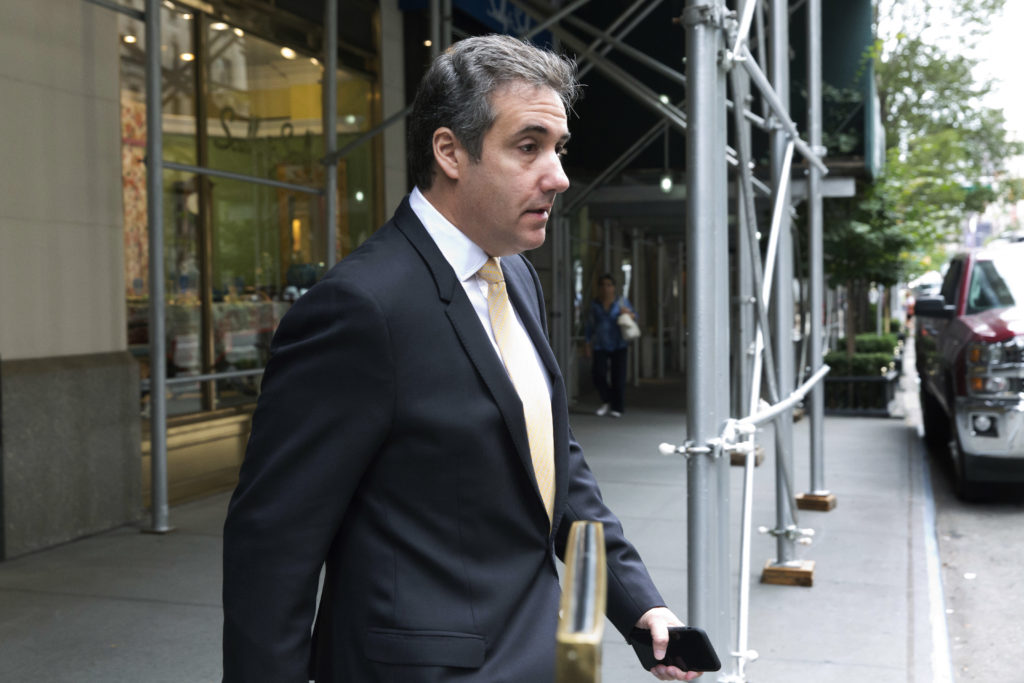
Michael Cohen, President Donald Trump‘s former personal lawyer and “fixer,” pleaded guilty Tuesday to campaign-finance violations and other charges, saying he and Trump arranged the payment of hush money to porn star Stormy Daniels and a former Playboy model to influence the election. The guilty plea came almost at the same moment former Trump campaign chairman Paul Manafort was convicted in Alexandria, Virginia, of eight financial crimes in the first trial to come out of special counsel Robert Mueller‘s sprawling Russia investigation. In a deal reached with federal prosecutors, Cohen, 51, pleaded guilty to eight counts in all, including tax evasion and making a false statement to a financial institution. He could get about four to five years in prison at sentencing Dec. 12. In entering the plea, Cohen did not name the two women or even Trump, recounting instead that he worked with an “unnamed candidate.” But the amounts and the dates all lined up with the payments made to Daniels and Playboy Playmate Karen McDougal. Cohen said the first payment was “in coordination and at the direction of a candidate for federal office,” and the second was made “under direction of the same candidate.” As cable networks were showing split-screen coverage of the dueling conviction and plea bargain by two former loyalists, Trump boarded Air Force One in the afternoon on the way to a rally in West Virginia. He ignored shouted questions to reporters about both former aides, retreating to his private stateroom on the airliner. Cohen’s plea follows months of scrutiny from federal investigations and a falling-out with the president, whom he previously said he would “take a bullet” for. The FBI raided Cohen’s hotel room, home and office in April and seized more than 4 million items. The search sought bank records, communications with Trump’s campaign and information on a $130,000 payment to Daniels and a $150,000 one to McDougal. Both women claimed Trump had affairs with them, which he denies. Trump denied to reporters in April that he knew anything about Cohen’s payments to Daniels, though the explanation from the president and his attorney Rudy Giuliani have shifted multiples times since. The president has fumed publicly about what he felt was government overreach, while privately worrying about what material Cohen may have after working for the Trump Organization for a decade. Trump branded the raid “a witch hunt,” an assault on attorney-client privilege and a politically motivated attack by enemies in the FBI. “Obviously it’s not good for Trump,” Sol Wisenberg, who conducted grand jury questioning of President Bill Clinton during the Whitewater investigation, said of Cohen plea bargain. “I’m assuming he’s not going to be indicted because he’s a sitting president, Wisenberg added. “But it leads him closer to ultimate impeachment proceedings, particularly if the Democrats take back the House.” The Justice Department’s Office of Legal Counsel, which provides legal advice and guidance to executive branch agencies, has held that a president cannot be indicted while in office. Trump’s lawyers have said that Mueller plans to adhere to that guidance, though Mueller’s office has never confirmed that. There would presumably be no bar against charging a president after he leaves the White House. Laurie Levenson, a former federal prosecutor and professor at Loyola Law School in Los Angeles, noted that the deal does not require Cohen to cooperate, but does not preclude it from happening, which should be worrying to the president and his allies. “What it shows is that the people close to the president have criminal exposure and it may mean they don’t need Cohen to cooperate,” she said. Levenson argued that the deal also knocks back the argument that the investigations swirling around Trump are a “witch hunt.” “No longer can you say Mueller is on a witch hunt when you have his own lawyer pleading guilty to things that were designed to impact the election,” she said. Mueller’s team is looking into Russian interference in the 2016 U.S. presidential election. The team referred the case involving Cohen’s financial dealings to federal prosecutors in Manhattan. Before the election, Cohen had been a trusted member of the Trump organization, working out of an office in Trump Tower next to one used by his boss. He raised millions for Trump’s campaign and, after being interviewed by the House Intelligence Committee last year, told Vanity Fair that Trump had no part in the suspected Russian conspiracy to tamper with the election. The president’s initial support for Cohen after the raid soon degenerated into a public feud, prompting speculation that, to save himself, Cohen might be willing to tell prosecutors some of the secrets he helped Trump keep. When Cohen’s team produced a recording he had made of Trump discussing one of the hush-money payments, Trump tweeted: “What kind of lawyer would tape a client? So sad!” Republished with permission from the Associated Press.
Prosecutors wrapping up case at Paul Manafort fraud trial
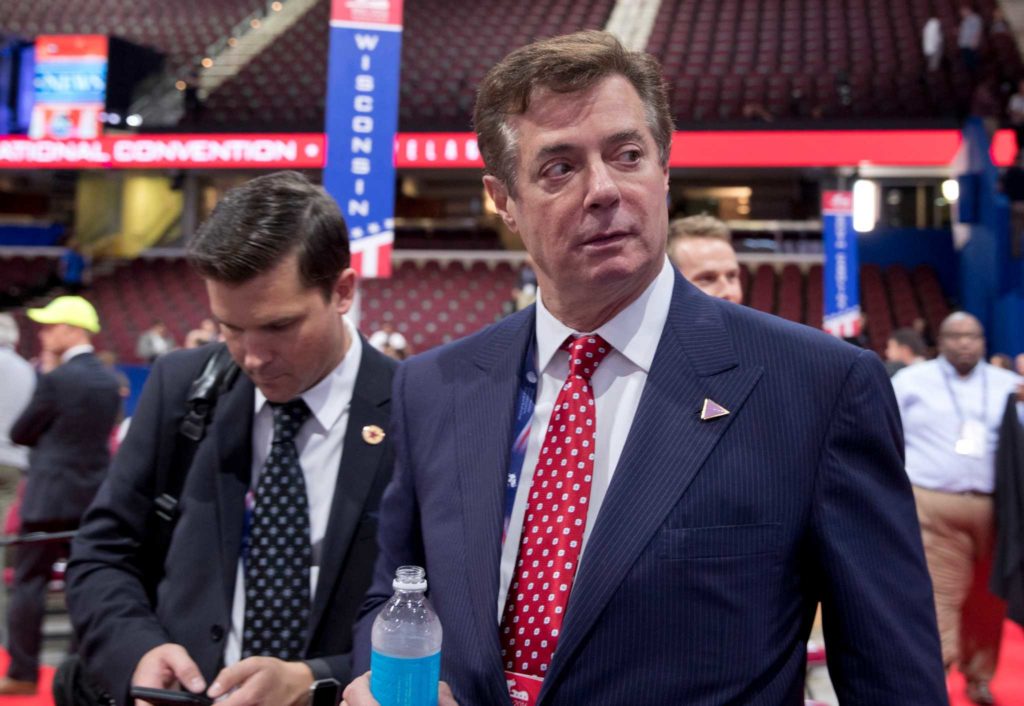
Prosecutors were poised Friday to wrap up their case against former Trump campaign chairman Paul Manafort, but the sometimes dramatic proceedings hit some unexpected delays after court opened. Judge T.S. Ellis III called a recess without explanation after huddling with attorneys from Special Counsel Robert Mueller’s office and Manafort’s lawyers for more than 20 minutes. Later after bringing court back into session, he strongly reminded jurors that they weren’t to discuss the tax evasion and bank fraud case with anyone. It was a hiccup as prosecutors headed toward resting their case against Manafort, proceedings that have been sometimes dramatic and featured tense exchanges with Mueller’s prosecutors. Earlier Friday, the prosecutors asked Ellis III to correct an earlier statement in which the judge suggested they were wasting the court’s time. On Thursday, prosecutors questioned a loan officer for Citizen’s Bank of New York, asking about Manafort’s 2016 loan application that the bank rejected. Ellis III interjected: “You might want to spend time on a loan that was granted.” Prosecutors said Ellis’ crack “misrepresents the law” regarding bank conspiracy and “is likely to confuse the jury.” Ellis did not immediately comment on the motion. The developments came after weeks of testimony that was sometimes tedious and based on bank and other records. Some spectators who had waited in line to attend the proceedings were seen falling asleep during a meticulous accounting of transactions, emails and ledgers that form the foundation of the case against Manafort. President Donald Trump’s campaign manager was a longtime political operator in Washington and elsewhere, right up to 2016 when the real estate magnate him as his campaign chairman. The prosecution is Mueller’s first of the investigation into Russian meddling in the presidential election, but neither Manafort nor his former protege Rick Gates has been charged in connection with their Trump campaign work. Though substantive, untelevised and far from a Trump-style reality show, the trial has featured some drama when star witness Gates testified against his former boss. Gates said he helped Manafort commit crimes in an effort to protect Manafort’s finances. Defense attorneys called Gates a liar interested in avoiding jail time under a plea deal. Gates was forced to admit embezzling hundreds of thousands of dollars from Manafort and an extramarital affair. When the two were first brought face-to-face in the courtroom, Manafort’s gaze bore down on his former protege and rarely wandered. Testimony was replete with examples of Manafort’s lavish lifestyle and allegedly falsified documents, including loan applications. Melinda James, a Citizens Bank mortgage loan assistant, testified that Manafort told the bank that a New York City property would be used as a second residence, but she found it listed as a rental on a real estate website. That distinction matters because banks regard loans for rental, or investment, properties as riskier and may impose restrictions, including on how much money they’re willing to lend. Jurors saw an email from Manafort to his son-in-law, Jeffrey Yohai, in which he advised him that an appraiser was looking to schedule a visit to the property. “Remember, he believes that you and Jessica are living there,” Manafort wrote in the email, referencing his daughter. The prosecution has called more than 20 witnesses, including Gates, and introduced a trove of documentary evidence as they’ve sought to prove Manafort defrauded banks and concealed millions of dollars in offshore bank accounts from the IRS. Along the way, they’ve not only faced an aggressive defense team but tongue-lashings, and a rare walk-back, from Ellis. The judge has subjected the prosecution to repeated scolding over the pace of their questioning, their large amount of trial exhibits and even their facial expressions. But on Thursday, Ellis told jurors he went overboard when he erupted at prosecutors a day earlier for allowing an expert witness to remain in the courtroom during the trial. “Put aside my criticism,” Ellis said, adding, “This robe doesn’t make me anything other than human.” Republished with the permission of the Associated Press.


